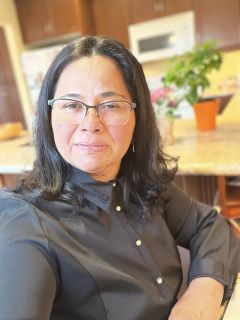-
Is God Your Priority?
 Written by Liliana Henriquez, volunteer with Iron Rose Sister Ministries in Colombia
Written by Liliana Henriquez, volunteer with Iron Rose Sister Ministries in ColombiaI'm one of those people who, when they like a song, listen to it a thousand times throughout the day (or several days) until it doesn't excite them anymore. I can literally search on YouTube: "An hour of... (title of the song)" and play it all day long. It becomes the first and only song I listen to for a long time. It becomes the soundtrack or the main song of my day (or days) and I enjoy it very much.
This reminds me of when we decide to obey the gospel and get baptized. Converting ourselves to Christ and everything that has to do with the church is our priority. We are excited to learn the lyrics to all the hymns we sing at service, attend all church activities, read the whole Bible, and know all the verses. We are passionate about Jesus!
How wonderful it would be if we maintained that same passion for the rest of our lives as Christians!
As expected, life goes on, and with it comes new decisions, challenges, and stages such as marriage, children, new jobs, university studies, travel, migration... and generally, these tend to diminish the passion for Jesus that we felt at the beginning. I don't mean that we stop loving Jesus or being His disciples; I mean that the cares of life are sometimes so heavy and challenging that they distract us from what is important, to such an extent that we could make the grave mistake of giving them the first place that only God deserves.
You shall not make for yourself an image in the form of anything in heaven above or on the earth beneath or in the waters below. You shall not bow down to them or worship them; for I, the Lord your God, am a jealous God, punishing the children for the sin of the parents to the third and fourth generation of those who hate me. (Ex 20:4-5 NIV, emphasis added)
As I read this passage, I am struck by these three words:
"MAKE": It leads me to understand that anything taking the place of God is an idol that we ourselves have the power to create.
"BOW DOWN": Everything we idolize causes us to take on an attitude of submission. Therefore, we yield our will to that idol.
"WORSHIP": We respect and give a place of preeminence to what we put first.
It's important to remember that we have a jealous God and we need to be very aware of that. He wants us to seek Him, to choose Him, to worship Him above anything else created in the world. Our life is hidden with Christ in God (Col 3:3) and we are to honor only Him.
I invite you to ask yourself: Is God the theme song of my life today?
I hope so. He is our King.
-
Jesus Christ: The Ultimate Example of Humility
 Written by Naijuvelin Díaz Leal, volunteer with Iron Rose Sister Ministries in Venezuela
Written by Naijuvelin Díaz Leal, volunteer with Iron Rose Sister Ministries in VenezuelaHave this mind among yourselves, which is yours in Christ Jesus, who, though he was in the form of God, did not count equality with God a thing to be grasped, but emptied himself, by taking the form of a servant, being born in the likeness of men. And being found in human form, he humbled himself by becoming obedient to the point of death, even death on a cross. Therefore God has highly exalted him and bestowed on him the name that is above every name, so that at the name of Jesus every knee should bow, in heaven and on earth and under the earth, and every tongue confess that Jesus Christ is Lord, to the glory of God the Father. (Php 2:5-11 ESV)
How many times have we heard or read about humility—that character that, although difficult, is not impossible to reach? The apostle Paul invites the Philippians to develop this character by taking Christ as their model. He presents this virtue to us as a reason for obedience and the consequence of exaltation. Humility, then, is an act of obedience. On another occasion, Peter would cry out, "Humble yourselves, therefore, under the mighty hand of God" (1 Pe 5:6a). We see how important it is and the effect that this condition always has on the Christian in any circumstance. Jesus Christ, being the Son of God, did not cling to that status, but lowered Himself, showing His meekness by bearing every scourge, confrontation, disappointment, emotional pressure, and betrayal.
Jesus showed the virtue of humility, full of grace and integrity; He was a model for the disciples and an example for all humanity. He willingly gave up His exalted position as the Son of God to bow down. He made manifest every good work that came from the Father. As His son, He bore suffering to teach us obedience and show us that in all obedience, there is a blessing. Christ is then presented to us as the model of humility in the following ways, while still not relinquishing His status as the Son of God:
- At His coming to earth (2Co 8:9).
- In His humility (Mt 11:29)
- In His submission to God's will (Jn 6:38)
- In His sufferings (Isa 53:1-9)
- At His triumphal entry (Mt 21:5,7)
Every perfect gift comes from above. Developing humility is a blessing, and executing it yields great benefits. When we are humble, we can attain salvation from God (Ps 18:27; 1 Co 1:26,29) and receive His grace (Pr 3:34). God honors the humble (Pr 15:33) and lifts them up (Job 5:11; Mt 23:12; Lk 1:52).
But what is humility? How do I recognize it? Is it a state of mind? A condition? Or a state of material poverty? Humility is acknowledging and exalting God's will over our own in our lives, gifts, virtues, and strength (Jn 5:19). When we constantly seek God and fully trust and accept His plans, that makes us humble and meek before Him. It is an attitude of the heart which goes beyond the external. To submit every thought or desire to Christ—to bring our cares and anxieties captive to Him—is to acknowledge His supremacy by recognizing His power and sovereignty.
Facing situations in which I must bend my will is a great challenge. It is a continuous challenge to know how to accept what God has determined. "My Father, if it be possible, let this cup pass from me; nevertheless, not as I will, but as you will" (Mt 26:39b) is an example Jesus set, reminding me to be humble in many moments of my life, and strengthening me in all areas.
Amid struggles, the apostle Paul continued His service in humility despite the sorrows that beset Him because of the Jews (Ac 20:19). He bore the marks of Christ on his body and bore them with patience and meekness. He exhorts us, too, to put on that garment that identifies us as God's chosen ones (Col 3:12).
Taking up this appeal allows us to live more committed to Christ, worthy of the vocation to which we were called, and the God of peace will guard our hearts in Christ Jesus.
Are you willing to develop this great virtue or spiritual strength?
-
Joshua Learned from Moses
 Written by Nilaurys García, volunteer with Iron Rose Sister Ministries in Canada
Written by Nilaurys García, volunteer with Iron Rose Sister Ministries in CanadaWhen we think of Joshua and Moses, probably the first thing that comes to mind is that because Moses could not enter the promised land, Joshua was chosen by God to lead the people as it says in Deuteronomy 31:3 (NIV), "The Lord your God himself will cross over ahead of you. He will destroy these nations before you, and you will take possession of their land. Joshua also will cross over ahead of you, as the Lord said."
Joshua carried a great responsibility on his shoulders, and for that God prepared him, giving him Moses as an example and mentor. Even the people recognized this, as we read in Joshua 1:16-18.
Whatever you have commanded us we will do, and wherever you send us we will go. Just as we fully obeyed Moses, so we will obey you. Only may the Lord your God be with you as he was with Moses. Whoever rebels against your word and does not obey it, whatever you may command them, will be put to death. Only be strong and courageous!
I would be a little afraid if I were Joshua having to carry the responsibility of leading a nation, even with God's help.
The interesting thing about this relationship is that Moses did not believe he was prepared for everything that God called him to do. But God also put people in Moses’ path from whom he learned, and he then passed on his knowledge to Joshua. For example, he learned from his father-in-law Jethro that he should teach about the law and delegate the task of being judges to the people (Ex. 18:13-26). In addition, he learned to recognize Jehovah's sovereignty and that His promises are always fulfilled as expressed in Joshua 23:14-16.
I think what strikes me the most about Moses' example was that he accepted a task that he did not think he was qualified for. Moses reminds God that it is not easy for him to speak, as if it were necessary to tell the Almighty God something about His own creation, and God responds that HE created him that way.
Moses said to the Lord, “Pardon your servant, Lord. I have never been eloquent, neither in the past nor since you have spoken to your servant. I am slow of speech and tongue.” The Lord said to him, “Who gave human beings their mouths? Who makes them deaf or mute? Who gives them sight or makes them blind? Is it not I, the Lord? Now go; I will help you speak and will teach you what to say.”(Ex. 4:10-12)
Moses' life is a constant reminder that God is in control of everything; his birth to being raised in Egypt gave him the tools necessary to carry out God’s purpose.
All that Moses went through served as an example to form the character of Joshua, who, at the death of Moses, had to lead the people and assume the position that his predecessor had before. In addition, he had the privilege of being called, "Moses’ aide" in Joshua 1:1. "After the death of Moses the servant of the Lord, the Lord said to Joshua son of Nun, Moses’ aide”. God also reminded Joshua that just as He was with Moses, He will also be with him. "No one will be able to stand against you all the days of your life. As I was with Moses, so I will be with you; I will never leave you nor forsake you” (Josh. 1:5).
Joshua had to apply all these teachings when he led the conquest of Jericho in Joshua 6:2-5 so the Israelites could take possession of the city. They were to march around the walls once a day for six days, and on the seventh day, when they marched, the walls would fall at the sound of the trumpets and the cry of the warriors.
I believe that just as Joshua had Moses, we all have had key people that God has placed in our lives to learn from. Their teaching and example helps us draw closer to our Heavenly Father. Do you remember who these people have been in your life?
#IronRoseSister #teachthroughrelationships #learnthroughrelationships #mentoring #learnfromamentor #MosesandJoshua #blog #guestwriter
-
Joshua's Fear
 Written by Alina Stout, volunteer with Iron Rose Sister Ministries in Oklahoma
Written by Alina Stout, volunteer with Iron Rose Sister Ministries in OklahomaImagine a moment when you were scared, anxious, or nervous about what was to come. Was it a bad storm? A meeting with someone? A phone call? A news report? A new job? A move to a new place? At that moment, you might have felt both emotionally and physically stressed. It is difficult to face a challenge when you feel so apprehensive.
Joshua had one of these moments, too. Israel’s fearless and humble leader Moses led the people of Israel out of Egypt and through the wilderness until they were finally ready to enter the promised land. God appointed Joshua to succeed Moses, and this was a good choice because Joshua had proven himself faithful forty years prior. He was one of the spies who visited Canaan, and he had faith that the LORD would deliver the enemy into the Israelites’ hands even though the Canaanites were a military threat (Nu 14). However, Moses was a great leader, and it would be difficult to succeed someone like him.
Joshua was now in charge of an entire nation of people who did not have a home and who had to fight in order to settle down. He had trusted in his youth that God would deliver the Canaanites into Israel’s hands, but would he trust that God would deliver the Canaanites into his hands, the leader of Israel? The people of Israel certainly would not be courageous if Joshua wasn’t.
God knows the hearts of all, and He spoke to Joshua on this matter when He appointed him. God reiterates to Joshua five times to “be strong and courageous” (Dt 31:6, 23; Jos 1:6, 7, 9 ESV).
God is not just telling Joshua to be a good leader. There is a way for Joshua to actively strengthen his heart and mind so that he is ready to face the challenges that lie ahead. God tells Joshua to be “careful to do according to all the law that Moses my servant commanded,” to “not turn from [the law] to the right hand or to the left,” to not let the “Book of the Law… depart from [his] mouth,” and to “meditate on it day and night” in order to be “careful to do according to all that is written in it” (Jos 1:7-8). God makes it clear that this is the only way to succeed in their conquest.
God also ensures him of two promises: God will give Israel the promised land, and God will be with Joshua wherever he goes (Jos 1:3, 9).
When God gave His Book of the Law to Israel, His intention was for the law to inspire spiritual change in those who meditate on it. The law revealed a person’s sin and provided a chance for repentance. The law helped the listener understand God’s heart for the marginalized, such as foreigners, the poor, women, and victims. The law also helped the listener understand God’s insistence on giving justice to those who deserve it. Reciting and memorizing the law would help Joshua internalize God’s will. Obeying the law would affect Joshua’s daily personal choices and leadership decisions. Meditating on the words of God would help clarify Joshua’s vision, fortify his mind, and purify his heart.
How did Joshua respond to God’s command? He obeyed. Joshua might have still been apprehensive of what was to come, but he chose to obey God. Being strong and courageous was a choice that would lead to a positive outcome. In the following chapters of Joshua, we see how Joshua immediately continued forward with God’s plan. His faith in God when he spied in the land forty years prior had become the faith that he was living out.
So, in those moments where you feel scared, anxious, or nervous for what is about to come, remember God’s words to Joshua. You too can become strong and courageous by fortifying your heart and mind with God’s word. When you meditate on the Word, you begin to understand God’s heart, God’s justice, God’s will, and God’s promises. You grow in faith and will trust God in your every step into the unknown.
Think about your Iron Rose Sisters and their struggles as well. You might be able to help encourage each other as you walk this path with God.
For what do you need to become strong and courageous in your life?
-
Knowing Christ and Kingdom Living
 Written by Kristi Bond, volunteer with Iron Rose Sister Ministries in Arkansas
Written by Kristi Bond, volunteer with Iron Rose Sister Ministries in ArkansasIf we are “out of our mind,” as some say, it is for God; if we are in our right mind, it is for you. For Christ’s love compels us, because we are convinced that one died for all, and therefore all died. And he died for all, that those who live should no longer live for themselves but for him who died for them and was raised again. (2Co 5:13-15, NIV)
The most memorable lesson I learned in college did not take the form of classroom instruction. It didn’t come from a book, and although I am grateful to my parents and professors who set me on a course of faithful service and academic excellence, this particular lesson was not theirs to give me.
During my first year in college, I worked at a Mexican food restaurant. It was hard work made even harder by the fact that I didn’t have a car for a while, so I had to catch rides from co-workers. I left campus as soon as I was finished with classes, and I arrived back at the dorm late at night with hours of studying still to do. My earnings were hard-won, and I intended to use them well. God knew how to use them better.
One day as I was reflecting on what it might mean to live for Christ, I decided that no matter what happened that day, I was going to have a positive attitude. I hitched a ride to work with about $50 cash in my jacket pocket, expecting to add some tips to it that night, I clocked in and hung my jacket on the pegs in the kitchen and worked my shift. Later that night, I realized the money was gone. I looked everywhere but couldn’t find it – it had not fallen out of my pocket; it had been taken.
I had a decision to make. Was I going to let this event make me angry, or was I going to stick with my earlier decision to let the peace and joy of Jesus Christ reign in me no matter what? Whichever of my co-workers that had taken the money was living for self. But God used that moment to teach me to live for Him —I made the right decision and went back to the dorm with a cheerful heart. It was the best $50 I ever “spent” because it has given me a better perspective not only about money but also about maintaining a positive attitude even when things go wrong.
Martin Luther wrote: “Above all the grace and the gifts that Christ gives to His beloved is that of overcoming self.” It is a gift to leave behind our selfishness and enjoy relationships and actions we might not have taken otherwise. It is a grace from God that allows us to hand over our fears, our failures, and even our trauma to One who can help us function through them. Living for self leads to entrapment in our own misery, and living for others results in enslavement to their actions and values. But living for Christ transforms all of who we are and all of our relationships, creating space for even tough situations to bring peace and abiding joy.
When we overcome self to live for Christ, we don’t have to react negatively or take offense at others. We can seek peace in challenging conversations instead of responding with hateful words – especially on social media! We can see chores and daily tasks as part of something bigger than ourselves and do them without complaint. Every moment is an opportunity to honor God – even when someone takes our hard-earned money.
What does overcoming self and living for Christ look like in your life today?
-
Learning From a Mentor
 Written by Rayne Paz, volunteer with Iron Rose Sister Ministries in Salvador, Brazil
Written by Rayne Paz, volunteer with Iron Rose Sister Ministries in Salvador, BrazilIn 2019, I participated in a mission program. I was sent to Peru with a team of fellow Brazilians. We knew that we would have the opportunity to build relationships with the Peruvian people. In fact, we had been trained to do so, and we knew that we would have the assistance of a coordinator in the field to instruct and help us in this new environment.
Having someone to learn from was of the utmost importance so that my team could build good relationships. Our mentor, along with his wife, guided us in the language, the city, contact with the brothers and sisters, and many other activities. However, for this to be successful it was necessary for us to have certain attitudes as learners. I would like to share some of them with you.
- Willingness to learn — Building relationships can be costly — we cannot relate to others without setting aside our fears and opening ourselves to learning. In the Bible, we see this in the mentorship between Moses and Joshua. God encouraged Joshua so he would not be afraid when relating directly to thousands of people. “Have I not commanded you? Be strong and courageous. Do not be afraid; do not be discouraged, for the Lord your God will be with you wherever you go” (Josh. 1:9 NIV).
- Humility and submissiveness — Unfortunately, we often misinterpret the concepts of humility and submission, causing us to not be faithful in living out these practices. However, the light of the Scriptures provides their correct meanings. When we submit ourselves and humbly learn, we can better apply the teachings that we receive because we know that they are effective and reliable. Of course, that confidence can come from a mentor inspired by and devoted to the Lord, and who desires to faithfully convey His will to us. During the battle against the Amalekites, Moses instructed Joshua to gather men for the fight and Joshua submitted, knowing that Moses was a prophet of God. “So Joshua fought the Amalekites as Moses had ordered” (Ex. 17:10a).
- Patience to observe — During our mission, we had to be very careful to observe the customs, language, and behavior of that new environment. Our advisor strongly recommended that we do this so that instead of venturing out with no direction, we would be able to understand first, and only then carry out whatever activity we had planned. This helped us a lot, especially in avoiding situations that could become barriers in the process of building new relationships. Before becoming the leader of his people, Joshua learned from and assisted his mentor, Moses, for 40 years. This certainly contributed to the later development of his own ministry.
- Readiness to put into practice — True learning can only occur when accompanied by practical action. After a few weeks on the mission field, my team and I started to put into practice everything we had learned and everything we were learning day by day. We were able to start conversations, be in small groups in homes, evangelize, spend time in fellowship, and serve the congregation. Day by day we developed relationships and bonds that, beyond a shadow of a doubt, will carry on throughout the rest of our lives. Our coordinator was then able to watch over us from a distance. If we needed him, he would be there, but at that point, we were independently developing good fruits. When Moses had to go, it was time for Joshua to put into practice what he had learned. The challenge was tremendous, but the Lord was with him. “Then Moses summoned Joshua and said to him in the presence of all Israel, ‘Be strong and courageous, for you must go with this people into the land that the Lord swore to their ancestors to give them, and you must divide it among them as their inheritance.’” (Deut. 31:7)
Mentorship is a mutual and blessed learning process for both the mentor and mentee. This exchange allows us to develop and serve in a most personal way. We need to take advantage of opportunities and hold onto people that teach and instruct in a way that is faithful to God, who are mature, who welcome us, and who transmit to us what was once taught to them. In the same way, we will pass on these teachings so that there are more and more mentors and apprentices of the Lord Jesus. Above all in this relationship, there will be learning from the Supreme Mentor: “Take my yoke upon you and learn from me, for I am gentle and humble in heart, and you will find rest for your souls” (Matt. 11:29).
Have you ever approached someone to mentor or be mentored? Think about the exchange of blessings that will be yours in this relationship.
#IronRoseSister #teachingthroughrelationships #learningthroughrelationships #mentor #learningfromamentor #missionwork #learnonthefield #blog #guestwriter
-
Learning from Our Mistakes
 Written by Johanna Zabala, volunteer with Iron Rose Sister Ministries in Ecuador
Written by Johanna Zabala, volunteer with Iron Rose Sister Ministries in EcuadorDeveloping meaningful relationships that are guided by the Heavenly Father has resulted in the growth of my knowledge of Him and in my desire to continue to serve the Lord Jesus Christ at every moment of my life in this earthly space.
As I grew from childhood to adolescence, I gained knowledge and developed increasingly significant beliefs, even as a result of making mistakes. I remember that making mistakes in the innocence of childhood was involuntary. Later as I matured, my mistakes were often voluntary when I deliberately made sinful choices. But I didn’t know how to accept them as steps in learning.
As a child, I had few interpersonal relationships. Establishing connections made me very insecure. Because of this shyness, some events triggered uncertainty, loneliness, and frustrations that at that moment I did not understand, and that became obstacles to my relationships.
When I was of school age, I remember that I always went unnoticed and when I made a mistake, I became very frustrated which prevented me from learning from these experiences. As time went by and as I got to know Jesus, I came to understand that each mistake was part of my growth and helped me to understand Romans 8:28 (NIV), “In all things God works for the good.”
Beloved sisters, if we realize that we can learn from our mistakes, we can encourage each other. We’ll know that when we make a mistake in a relationship, it provides an opportunity to grow and mature in faith and achieve the stature of Christ to which the apostle Paul exhorts us in Ephesians 4:13, “until we all reach unity in the faith and in the knowledge of the Son of God and become mature, attaining to the whole measure of the fullness of Christ.”
I still need to keep learning, and I'm sure you do, too. As human beings, we know that mistakes are normal and frequent in both our secular and Christian walks each time we think or do things we should not. But these struggles can become part of our spiritual growth when we accept that we are imperfect beings in the hands of a perfect God who perfects us every day in Christ Jesus.
Let’s not forget that “If we confess our sins, he is faithful and just and will forgive us our sins and purify us from all unrighteousness” (1 John 1:9). This promise teaches us that as human beings when we make a mistake, we will be forgiven and purified if we immediately repent—that is, change our attitude towards God—confess, and ask for forgiveness. It is necessary to humble ourselves, recognize the sinful nature that fights in our weakness from within, and beg to be transformed by the Lord's discipline.
Finally, whenever trials, weaknesses, and mistakes come, let us live Romans 8:28, knowing that the Almighty God intervenes with His infinite wisdom in everything, giving us the strength and experiences to help us when we do not dwell on the bad. Beloved, I hope you share this same spirit and that we will all continue towards this goal.
#IronRoseSister #teachthroughrelationships #learnthroughrelationships #learningbymakingmistakes #learnfrommistakes #mistakesorsins #blog #guestwriter
-
Listen Through the Word
 Written by Wendy Neill, Advancement Coordinator for Iron Rose Sister Ministries
Written by Wendy Neill, Advancement Coordinator for Iron Rose Sister MinistriesDo you have a favorite book? It might be from your childhood or something you’ve read as an adult. There’s a good chance you’ve been through it several times, and you love to recommend it to others. It might be a fictional story or a nonfiction book that changed your life. Impactful books are written by authors endowed by God with a special gift for words.
Is the Bible your favorite book? I hope so. We’ve probably all had seasons in our life when it was and seasons when it wasn’t. The author of Psalm 119 had a deep, abiding love for the Word of God which remained steadfast even in difficult seasons (see vv. 81-93). Let’s learn from him.
This author definitely had that God-given gift for masterful writing. He wrote Psalm 119 as an acrostic poem. When you were in school, did you ever have to write an acrostic poem where each line started with the next letter of your name? I was terrible at those. The poem always sounded forced.
Psalm 119 is divided into eight-verse stanzas. Within each stanza, all eight verses start with the same letter of the Hebrew alphabet! It is hard for us to see that artistic form since we aren’t reading it in the original Hebrew. Can you imagine writing eight verses that all begin with a difficult letter, like “X”? This author does it seamlessly and it doesn’t sound forced. He utilizes his exquisite skill and the entire Hebrew alphabet to express his love for God’s Word.
Keep in mind, he is not talking about the full Bible as we know it. He is referring to the first five books of the Old Testament: God’s laws, decrees, statutes, commandments, and ordinances. Here are some ways he describes God’s law:
- Great spoil/treasure/riches - vv. 14, 162
- A delight - vv. 24, 77, 143
- A path - v. 35
- A comfort - v. 52
- A light to our path - v. 105
- Sweeter than honey - v. 103
- A refuge and shield - v. 114
- Better than pure gold - v. 127
- Eternal - v. 160
- A source of great peace - v. 165
I can say that about much of our Bible, but those descriptions aren’t how I would personally describe Leviticus or Deuteronomy. This guy understands that God’s laws are meant to bless us, just as a wise, loving parent’s rules allow a child to thrive in a safe environment.
Throughout this psalm, the author alludes to listening to God through Scripture.
- Teach me your decrees so I can teach others. - vv. 12-13
- I spoke to you and you answered me. - v. 26
- Direct me in the path of your commands. - v. 35
- Teach me knowledge and good judgment. - v. 66
- The law from your mouth is precious. - v. 72
I encourage you to listen to God through His Word this week. Ask Him to teach and direct you. Read Psalm 119 first, then the next day, read from your favorite book of the Bible.
- What is God teaching you as you commit to listening through His written Word?
- How can you fall more in love with Him and the decrees He has set because He loves you?
- Is there someone to whom you can recommend His Book?
By the way, because this author loved God’s statutes so deeply—and used his talent to glorify Him—God added this man’s ode to the Scriptures for all future generations! What an honor!
-
Listening in Small Groups
 Written by Lisanka Martínez, volunteer with Iron Rose Sister Ministries in Venezuela
Written by Lisanka Martínez, volunteer with Iron Rose Sister Ministries in VenezuelaWhen we read in Ephesians 4:29 "Do not let any unwholesome talk come out of your mouths, but only what is helpful for building others up according to their needs, that it may benefit those who listen" (NIV), it is necessary to keep in mind that it is a command for all Christians in all times, places, and circumstances. Because of this, we notice the commitment that it represents to be able to express ourselves, as the Word indicates, so that our speech is edifying for those who listen to us, always avoiding the opposite.
This commitment, I confess, has been an uphill struggle for me on several occasions, and incredibly more so in my life as a Christian. Before I studied the Word, when I read or listened to this verse, it seemed to me to be directed at people who were mean in their language, uncontrolled, or who always spoke with malice and double meanings, offending and mocking others. I thought it was not addressed to me, who, although I said a bad word from time to time, tried to be careful where and to whom I said it, being respectful of the people with whom I had some contact.
Later, as a Christian, I remember an anecdote that happened to me during a discipleship class in which I participated shortly after being baptized.
I arrived 15 minutes early to the meeting set for 8 a.m. and I found only the sister in charge of the class who had been there since 7:30 a.m. The rest of the group arrived in a span of half an hour. Much later, the sister who led the class was the last to arrive with another of the sisters. When I asked them what had happened to them and why they were so late, the accompanying sister told me that it was the time the person in charge had told her because they needed to wait until everyone was there before beginning.
I was very upset, and I let the leader know that I thought it was disrespectful for her to arrive almost an hour late to start the class. My attitude had its immediate response: her face was transformed, and she spent the next half an hour sharing an improvised lecture (with its corresponding biblical passages) in which she explained why a neophyte like me should not call out a more mature woman in the faith. I listened to her speech quietly, still upset, and then we finally moved on to the prepared class material. Of course, nothing she said convinced me that she hadn't disrespected all of us. Being Venezuelan, I should have been used to that characteristic of many of my compatriots: the failure to comply with schedules and the lack of respect for others' time; however, I was not and still am not.
Reflecting on this experience, I now think that she, with more experience in the faith, should have simply apologized to everyone for being late and told me, the insubordinate one, that we would talk more calmly about the subject later, instead of showing that she was in charge and that the rest of us should respect and obey her. In conclusion, we both failed as friends, sisters, and group members.
How many of you have had something like this happen? (I remember a story shared by our sister Michelle where she related a similar experience involving a church trip to the beach, found in the book, In God’s Right Hand). Fortunately, those experiences now seem very distant, and we remember them more objectively, although for everyone in the group that day, it would not have been edifying despite the use of the Bible and the fact that no corrupt words were used.
Studying Social Work, I learned about what it means to be in a group and even more so if we formed a team: the commitment, the level of confidentiality, and cohesion that this implied. It should have been a piece of cake to transfer that to my church groups many years later. However, experience has shown me that I have failed in my commitment to God and to the members of the group because of the way I am, always trying to give instructions about the right way to do or say things without being loving, understanding, and compassionate enough in most cases. My commitment is not only to teach, but also to listen and show the greatest empathy, and I want my face and gestures to reflect the love of Christ and not just my words. Now, I work daily to correct and change with God's help.
Do you hear yourself and your sisters in your small group showing love?
-
Listening is an Altruistic Act
 Written by Amanda Santos, volunteer with Iron Rose Sister Ministries in João Pessoa
Written by Amanda Santos, volunteer with Iron Rose Sister Ministries in João PessoaWhen I was a child, my mother always said, “God gave us two ears and one mouth because we should listen more and speak less.” Although most of the time she was just reprimanding me for being a child who talked too much during classes and services, she was paraphrasing James 1:19: “My dear brothers and sisters, take note of this: Everyone should be quick to listen, slow to speak and slow to become angry” (NIV).
Today's theme says that “listening is an altruistic act.” If we search for the meaning of altruistic we find that it refers to someone who cares about others and acts voluntarily to benefit them. The Bible contains several verses that talk about altruism such as Philippians 2:3-4: “Do nothing out of selfish ambition or vain conceit. Rather, in humility value others above yourselves, not looking to your own interests but each of you to the interests of others." And John 13:34b says: "Love one another. As I have loved you, so you must love one another." The act of listening is the same as loving.
We live at such a busy pace that we even set audio messages we receive on communication platforms at advanced speed to hear and solve things faster. How many times do we watch a video of a class, even a sermon, and put it on “2x” because the faster we listen, the better? It seems like stopping and listening carefully to what someone else has to say will cost us so much. I put myself in this position. I've always liked to do things quickly, think quickly, and resolve things quickly. How many times have I chosen a cooking video to watch, and before the cook got halfway through the recipe, I decided that I had already heard everything I needed and could make the rest myself. Almost every time, I failed and had to go back and watch the video again to find out where I went wrong.
I remember a teacher who asked me a question in class: “Did you hear what I said, Amanda?” and I promptly answered yes. Then she asked again: “Okay, but did you listen to what I said?” Maybe at first you will have the same reaction as I did, “But aren’t those the same thing: hear and listen?” And the answer is no. Hearing is the capture of sounds by the ear, a mechanical and natural process that does not require interpretation. But listening is the action of paying attention, understanding and interpreting what is heard, and making use of it. How many times have I heard people but didn't listen to them?
It takes effort, attention, and dedication to fulfill the role of listener.
Effort is required because we need to break this bad habit of speeding things up. If you've gotten used to hearing everything very quickly, you'll find it strange and even uncomfortable having to listen to someone who speaks slowly. So yes, we need to put in effort to be good listeners.
Attention is necessary because our mind easily takes us away from the conversation. We remember that we didn't take the clothes off the line, we forgot to defrost the meat, or so many tasks that if we are not centered and paying full attention, our mind will ramble and we won't actually be listening to our sister.
And of course, listening takes dedication. Colossians 3:23 says, “Whatever you do, work at it with all your heart, as working for the Lord, not for human masters.” We need to dedicate ourselves day after day to being good listeners. Remember, listening to your brother or sister in Christ is an act of love. It is an act of service to the Kingdom of God.
When we are willing to listen to what a sister has to say, we are giving her a safe and trustworthy space where she can share her problems, confess her sins, and share her prayer requests with God. Being open to being that person who listens with an open heart and loves her sister is serving the Lord. If a sister comes to you to talk, she believes she will be in a safe place, without judgment, and with lots of love.
May we be attentive and available to be God's instruments in the lives of our brothers and sisters, and may our ears be open to listen to what they need to tell us. May our hearts be ready to love and exhort when necessary. And may only the Word of God come out of our lips.
-
Loneliness
 Written by Kara Benson, volunteer with Iron Rose Sister Ministries in Arkansas
Written by Kara Benson, volunteer with Iron Rose Sister Ministries in Arkansas“The Lord God said, “It is not good for the man to be alone. I will make a helper suitable for him”” (Gen. 2:18). We were not made to be alone. From the beginning of creation, God purposed that people should have companionship. As the poet John Donne observed, “No man is an island.” Instead of intending for us to live in isolation, God designed us to live in community.
“A father to the fatherless, a defender of widows, is God in his holy dwelling. God sets the lonely in families…” (Psalm 68:5-6a)
Indeed he has. He has set us in a family of fellow Christians. We should not have to go through life feeling alone because we have been given brothers, sisters, mothers, and children in Christ (Mark 10:29-31).
However, there are many who may be struggling with loneliness. Who might they be?
- An elderly resident living in a nursing home or retirement community
- A mother at home with her children
- A young adult who comes home from work each day to an empty apartment
- Someone who doesn’t have any family members living nearby
- A couple that just moved to the area and doesn’t know anyone in the congregation yet.
How can we help them?
- Visit the elderly and simply spend some time by their side.
- Invite someone to celebrate Thanksgiving or Christmas with your family.
- Throw a housewarming party for the young single lady who just bought her first house.
- Call someone who is homebound and listen to their stories.
- Check on a stay-at-home mom and see if you can meet her for coffee – or better yet, if you can bring coffee over to her house and visit with her for a while.
- Plan a weekend fellowship opportunity for young families to get together and get to know the new family in the congregation.
Sisters, I will share with you my personal experience of loneliness. During our second year of marriage, I was working from home on editing a Bible study workbook in Spanish. Aside from my husband and the students I tutored weekly in Spanish, I only saw people on Sunday mornings, Wednesday nights, and when I went to the grocery store. The hours I spent in silence, alone, seemed endless.
Then the pandemic hit.
Thankfully, a congregation in another town continued meeting. We drove up and met with them in the parking lot on Sundays. That was the highlight of my week – seeing their faces and waving to one another through the windows. Watching Hebrews 10:25 lived out was so encouraging to me. There is a reason that God inspired the author to write that command to not forsake the assembly – it is both for the sake of ourselves and for the sake of others. Even though we were singing in our cars and hearing the sermon broadcasted through the radio, we were still able to find a way to assemble and worship truly together.
We belong to one another. Paul writes, “you are no longer foreigners and aliens, but fellow citizens with God’s people and members of God’s household (Eph. 2:19). As members of God’s household in Christ, “we who are many form one body, and each member belongs to all the others” (Rom. 12:5). Has someone helped you feel like you belong? During my season of struggle, a mom from our congregation invited me to breakfast with her and one of her young children, and then to tag along on their grocery shopping trip. While going grocery shopping may seem mundane, it can be made into a ministry opportunity. Her invitation welcomed me to come alongside her and reminded me that I was not alone. What we did together was immaterial; I was grateful for being included in their lives. She made me feel like I belonged, and I hope her simple action will inspire you to do the same for another sister.
#IronRoseSister #HIStories #loneliness #community #oneanother #notaloneinChrist #guestwriter #blog
-
Loss is Gain
 Written by Katie Forbess, volunteer and President of IRSM Board
Written by Katie Forbess, volunteer and President of IRSM BoardIron Rose Sister Ministries’ theme for this year is “Committed to Christ 24/7 in 2024.”
Have you ever stood in a moment when you felt you could lose everything? I mean everything could literally be taken away from you. The life that you were living and all the reasons that you were holding your head high could be removed from you. If you were to lose literally everything that you had, what would you be left with?
I can’t say that this has happened to me, but I did face a time in which I seriously considered that it could. What was I left with? Christ. I was left with Christ. Christ to show me how to act and what to do. Christ to define who I am. Christ to give me a reason to keep going and put one foot in front of the other. Christ to allow me to say, “It’s going to be okay. I don’t know when or exactly how, but it’s going to be okay.”
“But whatever were gains to me I now consider loss for the sake of Christ” (Php. 3:7).
What did I gain? All that stuff that I was scared to lose became nothing, in comparison to my desire to know Christ better. Follow Him more. Read my Bible more. Talk to others about Him more. That experience made me rethink the way that I live day to day and the way that I am committed to Christ.
The theme for this year is very personal to me as I strive to continue counting everything lost in comparison to what I find and look forward to finding in Christ. I now live committed to Christ 24/7 but does that mean that I don’t have more to learn? No.
How does that commitment shape and form every other commitment in my life? I can say that what we will be studying this year as our theme was foundational to how I made it out of that situation and how it strengthened my resolve to get closer to Him.
Each month we will focus on a new theme to help us consider how we can be more committed to Christ including “Committed in Prayer,” “Committed to One Another in Christ,” and “Committed to Trust and Obey.”
Take a minute to consider everything you have as a loss compared to Christ. Every title you have earned, every relationship that you are in, all the money you have made—everything is gone. What are you left with? I pray the answer is Christ.
-
Love the Lord with All Your Heart
 Written by Ilca Medeiros, volunteer with Iron Rose Sister Ministries in Brazil
Written by Ilca Medeiros, volunteer with Iron Rose Sister Ministries in Brazil“Teacher, which is the greatest commandment in the Law?” Jesus replied: “Love the Lord your God with all your heart and with all your soul and with all your mind. This is the first and greatest commandment. And the second is like it: Love your neighbor as yourself. All the Law and the Prophets hang on these two commandments.” (Mt 22:36-40 NIV)
When we are called to talk about love for God, we almost automatically begin to talk about His love for us. We can do this excellently because it is a perfect and spotless love. When we become aware of such great love and such an impactful example, we come across a commandment (Mt 22:36-40), which would not make sense to us if it did not come from God: “Love”! It is not a love of only feelings, but of action. The Bible says that we should love Him above all things and this love is a reflection of God's unconditional love for us. First John 4:19 says, “We love because he first loved us.” When we feel this love for God, we want to please Him, obey Him, and serve Him with a heart full of gratitude.
The first source of love for God according to Matthew 22:36-40 is the HEART.
A clean heart without bitterness and resentment is a fertile land for cultivating love, which spreads to everyone around us. Whoever loves God with all their heart longs to be with Him, draws closer to Him, and develops intimacy through prayer, communion, and His Word. We like to be around those we love. So it should be with God. He doesn't need anything we have. Not even our love. Now we can imagine our Creator rejoicing in the fact that we love Him with all our hearts! I know that we are capable of feeling such love, of being side by side with Him every day, because He Himself promised in Matthew 28:20 that He would be with us every day. On good days and bad days. Just hold His hand.God knows how much we love Him by the way we treat our brothers and sisters. How we are connected to each other, how we see each other, how we care for and serve those in need. “...Anyone who loves God must also love their brother and sister” (1Jn 4:21).
The second source of love for God according to Matthew 22:36-40 is the SOUL.
Our soul is the center of our attitudes. It leads us to practice what comes from the heart. It's feeling in practice! The word soul comes from the Latin animu which means “that which animates”. It reveals our personality; it is the center of our will. Loving God with our soul means leaving behind everything that imprisons us and prevents us from serving. It's denying ourselves when love requires sacrifice and change.When we love God in our souls, we seek communion with our brothers and sisters even when our bodies are tired and we don't want to go to church. We still strive to offer God the best of ourselves with attitudes that please Him.
What our soul feels reflects in our body and our actions. We cannot forget to feed our souls with good things so that every offering of love to God has a sweet aroma. We become weak in our souls when we leave God out of our battles.
The third source of love for God according to Matthew 22:36-40 is UNDERSTANDING.
When we make the decision to serve God, we are asked if we understand the importance of our decision, and we say yes. We understand that from then on, our lives are linked to God for eternity. Once the initial thrill has passed, it is worth reflecting on: Who is God for us? What difference does He make in our lives? Are our relationships influenced by Him?The way we understand our new life in Christ makes us grateful, happy, and full of hope. We return to God a love that comes from Him. To understand His love, it is necessary for Him to live in us, as there is no other source of understanding this love other than in Him. The same God who loves us in practice, commands us to love Him. We are not obligated, but motivated to love Him by understanding that He is everything in us, knowing that He is our Creator, Father of Love, and Protector.
We love God when we understand the size of the connection we have with Him. We love not only in moments of blessings received but based on His feelings for us. Constant, continuous, and unconditional.
We can make a list of things we still are not doing to demonstrate our love for God. This love must be contagious. May everyone around us know how much we love Him, and may they want to know Him.
-
Loving, Trusting, and Being Obedient to the Word
 Written by Deanna Brooks, volunteer with Iron Rose Sister Ministries in Arkansas
Written by Deanna Brooks, volunteer with Iron Rose Sister Ministries in ArkansasPsalm 119, the longest psalm—written in alphabetic acrostic form, using a letter from the Hebrew alphabet to start each section of eight verses—is thought to have been written by David, not in his usual manner, but with bursts of exclamations about our Holy God. While some scholars suggest other authors, my opinion is that it sounds like David’s other writings, so I will be referring to him as the author.
When I read Psalm 119, I think of the time in 2 Samuel 6 when the ark of the covenant was brought back to Jerusalem and David was leaping and dancing in the street. Psalm 119 is full of this kind of joy and spontaneous delight despite trials and hardships because of the trust the writer had in the Lord.
Matthew Henry describes Psalm 119 as “a collection of David's pious and devout [expressions], the short and sudden breathings and elevations of his soul to God… a chest of gold rings, not a chain of gold links.”
David mentions these attributes of the Lord… attributes which lead to his and our love for God and trust in Him, which then take us to an obedient life:
Trustworthiness (v 42)
Righteousness (verses 7, 62, 75, 106, 123, 138, 144, 160, 164, 172)
Faithfulness (v 86)
Truthfulness (verses 43, 142, 151, 160)
Unchangeableness (v 89)
Light (v 105)
Purity (v 9-11)
Eternal (verses 90, 152)David writes of slander, persecution, and taunts against him, but his confidence is in the Word of God, described throughout the psalm with these words:
Law
Precepts
Testimonies
Statutes
Word
Commandments
Judgments
OrdinancesPsalm 119 reminds us how sufficient the Word of God is as it expands on Psalm 19:7-9 (ESV):
The law of the LORD is perfect, reviving the soul; the testimony of the LORD is sure, making wise the simple; the precepts of the LORD are right, rejoicing the heart; the commandment of the LORD is pure, enlightening the eyes; the fear of the LORD is clean, enduring forever; the rules of the LORD are true, and righteous altogether.David begins Psalm 119 with a blessing for those who walk in the law of the Lord and seek Him with their whole heart, reminding us of words written in Psalm 1:2, “But his delight is in the law of the LORD, and on his law he meditates day and night.”
He then continues in Psalm 119 with other verses that lead us to loving, trusting, and obeying our Lord:
“Oh that my ways may be steadfast” (v 5).
“With my whole heart I seek you; let me not wander from your commandments! I have stored up your word in my heart, that I might not sin against you” (v 10-11).
“I will delight in your statutes; I will not forget your word” (v16).
“Make me understand the way of your precepts, and I will meditate on your wondrous works” (v 27).
“I have chosen the way of faithfulness” (v 30).
“I will keep your law continually” (v 44).
“In your steadfast love give me life, that I may keep the testimonies of your mouth.” (v 88).
“Oh how I love your law! It is my meditation all the day” (v 97).
“Your word is a lamp to my feet and a light to my path” (v 105).
“Consider how I love your precepts! Give me life according to your steadfast love” (v 159).
“I long for your salvation, O LORD, and your law is my delight” (v 174).
When David wrote this psalm, we see the love, trust, and desire for obedience in his heart.
Similar thoughts are found in Psalm 33:4-5, 22:
For the word of the LORD is upright, and all His work is done in faithfulness. He loves righteousness and justice; the earth is full of the steadfast love of the LORD…Let your steadfast love, O LORD, be upon us, even as we hope in you.1 Samuel 13:14 and Acts 13:22 call David a man after God’s own heart. I think in reading Psalm 119 we easily see that the writer longs to do the will of the Lord as he praises and delights in His commands.
For us: Do we have that intense longing to do God’s will? Do we hunger and thirst after righteousness (Mt. 5:6)?
-
Making Christ Known Across the Nations
 Written by Deanna Brooks, volunteer with Iron Rose Sister Ministries in Arkansas
Written by Deanna Brooks, volunteer with Iron Rose Sister Ministries in ArkansasIn the fall of 1965, my grandparents moved to Junction City, Arkansas, to work with a small congregation. Grandad was 73; Mama Dee was 68 and completely blind from diabetic complications. They moved into a house across the street from the school, and, like they always did, began making friends with neighbors.
About three years later, a family moved into a house on the school property. My grandparents noticed four-year-old Alan, and he could often be found at their house eating cookies and drinking milk while Mama Dee told him about Adam and Eve, Moses, Joseph, David, and most importantly Jesus.
The family did not go to church anywhere. The father was an alcoholic who drank much of his school teaching salary. Alan never missed going to church with my grandparents, and as soon as his younger brothers were able to go, he brought them along, too. Grandad taught Alan to read scripture in public, lead singing, and lead prayer.
There were times when I was visiting, and my grandmother would make a pot of soup or roast and potatoes to take across the street to the family.
Occasionally the mother accompanied her children to church. The father was hostile and told my grandad not to take his family to church, but Alan would slip away with his brothers while his dad was away or sleeping drunk and come anyway.
Then, the family moved. My grandparents grieved, and they often prayed that the boys would not follow in their dad’s, Phil’s, footsteps. When the family moved, the dad’s sister who was a faithful Christian lived nearby and was able to be more involved, and she enlisted the help of the local preacher.
The day came when God got Phil’s attention, and Phil was willing to listen. A few days later my grandparents got a letter from Phil, thanking them for loving him and his family, even though he had been a “no-good heathen.” He wrote about being baptized for the remission of sins and said that he wanted to tell others the good news.
A few years ago, I received a message from Alan who said he had told the story of Jim and Dee Layton all over the world… how they reached out to a small child and began telling him simple truths from the Bible, leading him to faith in Jesus. My grandparents lived 1 Corinthians 9:19b: “I have made myself a servant to all, that I might win more of them” (ESV). They saw a need and quietly met that need.
Phil, his son Alan, and Phil’s other sons have spoken at events over the last 45 years or so, reaching people who would never come into the door of a church building. They have taken the gospel message outside the walls and have told the message of salvation to countless thousands.
All of this started with an older couple who noticed a small child and opened their home and hearts to him. I am reminded of Jesus who said, “Let the little children come to me” (Mt 19:14a).
“For we are his workmanship, created in Christ Jesus for good works, which God prepared beforehand, that we should walk in them (Eph 2:10). My grandparents had been doing their good works for many years wherever they were, and the love they showed Alan and his family was just the way they lived life.
Paul wrote to Timothy: “What you have heard from me in the presence of many witnesses entrust to faithful men, who will be able to teach others also” (2Ti 2:2).
An older couple… neither of whom finished high school… a young boy… a sister… another preacher… and the Word of God combined to bring a family into the fold, and that family has been able to reach out to many others.
We look around and see people who don’t know the message someone taught us. Will we be part of Paul’s admonition to Timothy to teach faithful men (and women) who in turn will teach others also?
-
Master Jesus!
 Written by Kat Bittner, volunteer and Board member for Iron Rose Sister Ministries in Colorado
Written by Kat Bittner, volunteer and Board member for Iron Rose Sister Ministries in Colorado“Love is a great master. It teaches us to be what we never were.”
(Jean-Baptiste Poquelin aka Molière)
I really do appreciate those words. I appreciate them because they exemplify relationship with Jesus. You see, love invokes a sense of action. It calls on us to do things that, albeit good and wonderful, are often out of our nature. Love calls us to do things we may never have done and to be what we may never have been. Personally, I’ve not much patience for folks who are ill-tempered or self-centered. If someone has wounded my family or friends, it can be considerably troublesome for me to be kind. It is nearly impossible for me to forgive the wicked and ungodly who violate children. And I’m not generally eager to abandon my addictive, gluttonous behaviors with food. I do love those carbs and sugar. A lot!
If I am to do anything to be what I’ve never been—to let love be a great master in my life—I have to be like Jesus. Jesus is love, characterized by all the things that love does (1Co 13:4-8). I must be mastered by Him rather than be mastered by my selfish inclinations. And while there can be no perfection in me for whatever I choose, I can certainly aim to do my best and allow Jesus to guide my path.
“A man’s heart plans his way, But the Lord directs his steps.” (Pr 16:9, NKJV)
I have spent most of my life struggling with morbid obesity, an addictive and unhealthy relationship with food, and a latent self-loathing. I was especially good at denying the animus I had with my body. It’s only been in the last several years that I’ve come to realize the former declarations of “I’m happy” or “I’m not insecure” were actually lies that allowed my struggles with food to master my life. I wasn’t happy in my obesity. I wasn’t happy when I binged. And I wasn’t happy or confident in my body despite my proclamations to the contrary. Rather, I was being mastered by my manipulative tendency instead of letting Jesus master me.
Scripture tells us that “the flesh desires what is contrary to the Spirit, and the Spirit what is contrary to the flesh. They are in conflict with each other so that you are not to do what you want” (Gal 5:17, NIV). Doing what I wanted—consuming food to extremes for my emotional pleasure—was contrary to the Spirit. It was the sin of gluttony, too, and for an extraordinarily long time, I denied that as well. I wasn’t being mastered by Jesus. In truth, I was being mastered by sin. I was among those “… whose conduct shows they are really enemies of the cross of Christ … headed for destruction. Their god is their appetite” (Php 3:18b-19a, NLT). Wow! I was convicted after God lovingly but firmly reiterated in His word that I needed profound change. That change could only come through letting Jesus master my life rather than my god of food.
“God’s truth stands firm like a foundation stone with this inscription: ‘The Lord knows those who are his,’ and ‘All who belong to the Lord must turn away from evil’” (2Ti 2:19b, NLT).
If I were to emulate Jesus, I needed to give up the sin (evil) in my life to be what I never was before. And once I stopped denying that I was being mastered by food, I could begin to be mastered by Jesus. I needed only to give it fully to Him.
“If we confess our sins, He is faithful and just to forgive us our sins and to cleanse us from all unrighteousness” (1Jn 1:9, NKJV).
Owning my addictive behavior and self-manipulation was a first step. Along with support from friends and family, wise counsel, and a good amount of weight loss which resulted in the resolution of all my co-morbidities, I am a different person. I am better because of a change in my thinking. I am better because of renewed focus. But more than those, the thing that has made me better is Jesus!
Jesus is the great Master! He teaches us to be who we never were before. Who will you be that you have never been before with Jesus as your Master?
-
May Your Word to Me Be Fulfilled
 Written by Amanda Vilela, volunteer with Iron Rose Sister Ministries in Sergipe, Brazil
Written by Amanda Vilela, volunteer with Iron Rose Sister Ministries in Sergipe, BrazilThe gospels narrate facts about the life of Christ, from His birth to His crucifixion, resurrection, and ascension. The book of Luke gives us particular details about the first events in Christ’s life on earth. He tells us that Mary was the woman God chose as the instrument for the coming of Christ into the world.
Mary decidedly makes herself available to do God’s will. It is important to remember that Mary was an ordinary young woman, subject to the same weaknesses and challenges that life imposes on us, but she understood the greater purpose of human existence: to give glory solely to God, and worship and serve Him only (Lk 4:8). How beautiful is her example of obedience to God; how sweet were her words:
My soul glorifies the Lord and my spirit rejoices in God my Savior, for he has been mindful of the humble state of his servant. From now on all generations will call me blessed, for the Mighty One has done great things for me— holy is his name. His mercy extends to those who fear him, from generation to generation. (Lk 1:46-50 NIV)
The figure of Mary is frequently inaccurately interpreted by many who do not understand that glory and praise should be given only to God. All of us humans, even though the Lord is merciful with us and trusts us with great missions, are merely instruments in His hands.
We can extract valuable lessons and teachings from Mary’s story. After all, what made Mary special? Why did the Lord choose her for this mission? Mary had the same thing Sarah, Deborah, Ruth, Abigail, Lydia, and many others who were used by God in His work had: a heart surrendered to the Lord and willing to live in accordance with His will—ordinary women who loved God’s commandments.
Reading the Bible, I admire the way that men and women placed God’s will before their own, as is made clear by the way they presented themselves to the Lord: “Here am I” (Isa 6:8), “Speak, for your servant is listening” (1 Sa 3:10), and “I am the Lord’s servant” (Lk 1:38).
Mary understood that obeying God would cause radical change in her life. As a result, she ended up becoming a target of persecution. We see this clearly when Mary and Joseph, guided by an angel of God, flee to Egypt fearing persecution from Herod. Obeying God means living a life of self-denial and trust. We are convinced that God will fulfill our needs as He fulfilled those of Mary and Joseph. Even though she carried the Messiah in an “uncomfortable” way during the end of her pregnancy, they continued traveling, trusting in God’s care. They surrendered their lives in obedience to the Lord, with the certainty that His promises would be fulfilled, “For no word from God will ever fail” (Lk 1:37).
Mary trusted that God would be her defender in the face of possible accusations with respect to her integrity as a woman. Above all, Mary’s good example teaches us to put ourselves in the position of servants. Her example teaches us humility, virtue, loyalty, obedience, and a God-fearing heart.
Mary was a woman chosen by God to bring the Savior into the world, and she was at the foot of the cross. She followed His steps and walked with Jesus in His mission, being an example of faith and obedience—a woman after God’s own heart. May Christ help us to walk with faith and to respond to our call as Mary did. “May your word to me be fulfilled” (Lk 1:38).
-
Men and Women Who Followed in Jesus' Footsteps
 Written by Ana Teresa Vivas, volunteer for Iron Rose Sister Ministries in Canada
Written by Ana Teresa Vivas, volunteer for Iron Rose Sister Ministries in CanadaAt the risk of emphasizing the obvious, I'm going to repeat the title of this blog post: "Men and Women Who Followed in Jesus' Footsteps" and emphasize the highlighted phrase because I want to focus on it.
In the gospels, we can learn the names of the apostles— the twelve closest followers of Jesus. Additionally, we can learn something of their lives and their example as imitators of Him. But there were also other men and women who followed Jesus, if not so closely or from the beginning of His ministry, but still with the same great love and commitment to Him and His work.
We cannot identify them all specifically because there were multitudes who followed Jesus, although many also abandoned Him (Jn 6:66), but we will not talk about these today.
Let's look at this short list:
Luke 19:1-9, Zacchaeus
John 4:46-53, King's Officer
Mark 15:40-41, Mary Magdalene, Mary, the mother of James the younger and Joseph, and Salome
Matthew 12:15, A crowdSoon afterward Jesus began a tour of the nearby towns and villages, preaching and announcing the Good News about the Kingdom of God. He took his twelve disciples with him, along with some women who had been cured of evil spirits and diseases. Among them were Mary Magdalene, from whom he had cast out seven demons; Joanna, the wife of Chuza, Herod’s business manager; Susanna; and many others who were contributing from their own resources to support Jesus and his disciples. (Lk 8:1-3, NLT)
These are people, just like you and me, who believed in Jesus. We don't know in detail about their lives as disciples. We only know of their encounters with Him, and we can see their examples of commitment.
Look at the example of the women mentioned in Luke 8:1-3. It impresses me to think of myself in the place of one of them and imagine walking after Jesus two centuries ago. No way! I have so many questions for them, such as what it was like being a woman and living within their culture. And what about the issue of female grooming? They were very confident about who to follow and why. That alone explains their investment of energy, time, and money in Jesus and His evangelistic campaign.
With these people, we can identify and "chew on” what a follower of Jesus looks like and how I can represent that in the 21st century.
Someone who follows in the footsteps of Jesus is willing to change their values (Zacchaeus), is not afraid of threats (Joanna, the wife of Herod's steward), and risks their position (the king's official).
There are many more examples of men and women following Jesus in the gospels, and from all of them, if we stop for a few minutes, we can learn something if we look closely— if we get into that "movie" of the life of Jesus.
Who is a follower then? From the examples that we can find in the four books that narrate Jesus' life, we can conclude that these are some of the characteristics of His followers: they are willing to change their lives, to invest their monetary gains in the work of Jesus, to invest energy and time, and to sacrifice comforts. These are some of the ways those early disciples showed their commitment and set an example of how to follow the Lord.
What other ways can you identify that they were fully engaged? What other things did they sacrifice? How do you see yourself as a follower of Jesus?
Add your answers to these questions in the comments or make any other observations based on the topic of this blog post.
I encourage you and me to look to Jesus 24/7, 365 days a year, and get from Him the motivation to be His faithful followers.
-
Moses Walked with God and the Cloud
 Written by Corina Diaz, volunteer with Iron Rose Sister Ministry in Argentina
Written by Corina Diaz, volunteer with Iron Rose Sister Ministry in ArgentinaWhen I read the story of Moses, I imagine the cloud that accompanied the Israelite people during their wandering through the wilderness, clearly displaying the presence of God, showing them His power and care.
On the day the tabernacle, the tent of the covenant law, was set up, the cloud covered it. From evening till morning the cloud above the tabernacle looked like fire. That is how it continued to be; the cloud covered it, and at night it looked like fire. Whenever the cloud lifted from above the tent, the Israelites set out; wherever the cloud settled, the Israelites encamped. (Num. 9:15-17 NIV)
We notice that the cloud accompanied the people, but above all, it guided and pointed them toward the place where they were to dwell; it was the actual presence of God, visible to them to indicate His constant presence. This is a wonderful fact: the presence of God was with them.
It reminds me of the times when I seek the presence of very close people in my life that help me feel more secure when facing important challenges, but it also invites me to remember that I don't need the physical presence of a cloud because Jesus dwells in my heart and leads my life.
There is another interesting characteristic of the cloud that accompanied Moses: this cloud contained the burning glory of God.
When Moses went up on the mountain, the cloud covered it, and the glory of the Lord settled on Mount Sinai. For six days the cloud covered the mountain, and on the seventh day the Lord called to Moses from within the cloud. To the Israelites the glory of the Lord looked like a consuming fire on top of the mountain. Then Moses entered the cloud as he went on up the mountain. And he stayed on the mountain forty days and forty nights. (Ex. 24:15-18)
We conclude that this cloud had two functions: to guide and provide shade for the people, and also to protect the people from the glory of God that burns like fire. I believe that the presence of God works for us in the same way; far or near we know that His presence accompanies us and protects us. Jesus, in turn, as an intermediary between us and the Father, takes us by the hand and allows us to have a direct connection with the Creator.
Are you looking to God to lead and protect you as you journey through life?
#IronRoseSister #teachthroughrelationships #learnthroughrelationships #lifelonglearner #walkingwiththecloud #gloryofGod #blog #guestwriter
-
Motherhood and Joy
 Written by Vivian Arcila, volunteer with Ministerio Hermana Rosa de Hierro in Canada
Written by Vivian Arcila, volunteer with Ministerio Hermana Rosa de Hierro in Canada“So in the course of time Hannah became pregnant and gave birth to a son. She named him Samuel, saying, “Because I asked the Lord for him.”(1 Sam. 1:20)
Before I became a Christian, I had two children. Six years after being baptized for the forgiveness of sins, I prayed to the Lord asking Him to give me a third child, if it was His will. In 2006, God responded to my prayers and I had a beautiful, healthy baby boy. However, at that time, I was 38 and when I was three months pregnant, I had facial paralysis and since I was pregnant, they couldn’t give me the treatment because it might affect the baby. The result was that I have still not recovered full mobility of the left side of my face. This saddened me because I liked to be happy and smile. Additionally, the world had recently entered into the digital stage where people were sharing pictures on social media, but my face would likely never look the same. The happiness from my motherhood was eclipsed by this unexpected change in my life. They were difficult months in which I had many mixed emotions: the joy of having a new baby in my arms and yet feeling that I no longer had beauty in my face. I was active in the church, especially in the area of evangelism, but with my new appearance, I didn’t feel sure of myself nor excited to share a conversation with someone.
Those dark months led me to seek the Lord’s presence, to seek Him in prayer, and to read His Word. It was also a season in which I could examine myself in the light of the Bible and repent for areas in my life in which I was not being obedient. My insecurities led me to disconnect from the world, but at the same time, I was getting to know God more. In His Word, we discover that at times, the answers to our prayers are Yes, as He answered Hannah, Samuel’s mother, and me with my pregnancy. But at other times, like He said to Paul, “But he said to me, ‘My grace is sufficient for you, for my power is made perfect in weakness.’”(2 Cor. 12:9)
What a beautiful revelation! And so, I prayed again to the Creator and I said, “Lord, if you aren’t going to return the mobility in my face, please give me Your grace so that I can draw closer to others with a new smile in the Spirit that they will notice.” From that moment on, I began to be filled again with the immutable joy of the Lord, that is found in Christ’s sacrifice for our sins and that brings us hope of eternal life, which is not changed by any temporary or permanent situation happening in my life.
It is true that God, as a kind and merciful Father, responds to our requests through dreams or goals in this world, but these answers are not always in line with what we want. There are women who have prayed that they could be mothers, but they have not gotten pregnant; others for a husband, but have never married; others for healing from an illness that has not come about; and others for reconciliation in marriage or family relationships that have not been resolved. Therefore, we may ask ourselves, is His grace sufficient for us? Is the power of God being perfected through our weakness? Am I living joyfully in the Lord or am I frustrated because my personal goals are not being achieved? Is God’s plan for my life and others’ lives more important than my human aspirations?
So, is the source of my joy in motherhood or in marriage? In beauty or in a successful career? Maybe in not having any illness?
It's not that it's a sin to have aspirations in this life. The problem is when we live frustrated for not achieving them and lose the joy of our salvation, or when these earthly goals take the Sovereign Creator’s place in our heart.
According to the world’s standards, we will always lack something in order to feel complete: be taller, a beautiful face, a husband, a child, a grandchild, more or less weight, a university degree, a promotion, my own home or a bigger home, but the Word of God in Colossians 2:9-10 tells us where our fullness comes from: “For in Christ all the fullness of the Deity lives in bodily form, and in Christ you have been brought to fullness. He is the head over every power and authority.”
What is most important to us? Personal success or to be transformed into the image of Christ?
#IronRoseSister #HIStories #Hannah #motherhood #truejoy #guestwriter
Page 5 of 9

